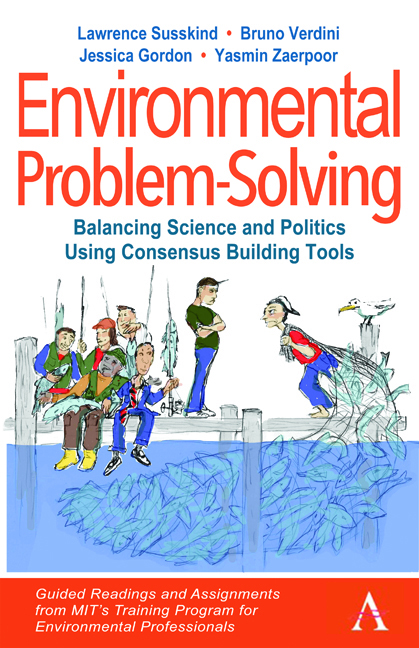 Environmental Problem-Solving: Balancing Science and Politics Using Consensus Building Tools
Environmental Problem-Solving: Balancing Science and Politics Using Consensus Building Tools Book contents
- Frontmatter
- Contents
- Acknowledgments
- Credits and Permissions
- Introduction
- Unit I: Influencing The Environmental Policy-Making Process
- Unit II: Ethical Dilemmas In Environmental Problem-Solving
- Unit III: Developments In Policy And Project Analysis
- Unit IV: Collective Action To Solve Environmental Problems
- Final Exam
- Conclusions
- Biographies
- References
- Index
Conclusions
Published online by Cambridge University Press: 15 December 2020
- Frontmatter
- Contents
- Acknowledgments
- Credits and Permissions
- Introduction
- Unit I: Influencing The Environmental Policy-Making Process
- Unit II: Ethical Dilemmas In Environmental Problem-Solving
- Unit III: Developments In Policy And Project Analysis
- Unit IV: Collective Action To Solve Environmental Problems
- Final Exam
- Conclusions
- Biographies
- References
- Index
Summary
Some environmental problem-solving books appear to suggest that the only thing you need in order to solve an environmental problem is the right tool or method. By now you realize we do not accept that premise. Environmental Impact Assessments (EIA), for example, can be used to help decision makers, including stakeholders, think about the advantages and disadvantages of alternative designs, technologies or locations (and they should!), but a final decision about whether to proceed with a project and whether the unavoidable adverse impacts should be accepted, is a political choice, not a technical one. And, in almost every case, there are sure to be disagreements among groups who favor or oppose various versions of the project or policy being considered. They can use cost-benefit analysis to justify their positions, but, as we discussed in Unit III, many of the decisions related to the design of the tool are subjective and the results of a CBA will not be definitive.
Philosophical or, more appropriately, ethical, considerations will always come into play. And, while elected and appointed officials, or the courts if it comes to that, will have the final say in a democracy, there is almost always room for informal consultation with a wide range of stakeholder groups prior to the government making a final decision. Our view is that environmental problem-solving requires finding a balance between science and politics and debating the ethical choices involved. This is best accomplished through open public deliberation. The credibility of the judgments that emerge also depends on transparency and accountability. That is, the officials and experts involved need to make explicit the information and analyses they are relying on. The stakeholders and the general public need to take advantage of the opportunities offered to challenge the technical basis for government (or industry) decision-making.
Both process and outcome are important. Since there are no “correct” answers, the decisions that officials make (on behalf of the public) must be justified. All possible justifications are rooted in philosophical or ethical assumptions about the role and responsibility of citizens to each other, our responsibilities for the maintenance of a functioning ecosystem, and our responsibilities to future generations. Each person offering a “solution” needs to explain why they have taken the position they have, and what interests they have at stake. In the process, they will reveal their personal theory of practice.
- Type
- Chapter
- Information
- Environmental Problem-Solving: Balancing Science and Politics Using Consensus Building ToolsGuided Readings and Assignments from MIT's Training Program for Environmental Professionals, pp. 481 - 484Publisher: Anthem PressPrint publication year: 2020


